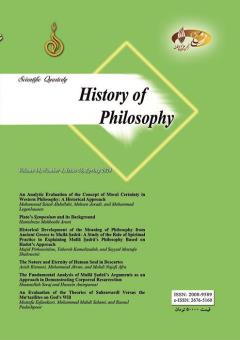Plato’s Symposium and its Background
Subject Areas : Connection of philosophers’ views and philosophical schools with the social and philosophical conditions of the time
1 - Associate Professor, Philosophy Department, Tarbiat Modares University, Tehran, Iran
Keywords: Symposium, Laws, written and spoken discourse, Eros,
Abstract :
Plato’s Symposium is an unparalleled philosophical-literary masterpiece, which demands a serious approach to rereading it because of its quality of expression, linguistic style, powerful narration and reasoning, and synthesis of mythology and philosophy, as well as dealing with certain important subjects such as love, immortality, and eternal happiness. The present paper aims to explore and elucidate some of the historical, cultural and social backgrounds of Symposium because any negligence in this regard will render the analysis of its content incomplete and inaccurate. In this study, the author initially deals with the tradition of symposium in ancient Greece, its formation, and the cultural changes it underwent over time. Then he investigates Plato’s approach in his other works as to the nature of symposium and his re-evaluation and re-formulation of this concept. This analysis reveals Plato’s extent of loyalty to his own criticisms of this tradition in the dialog of Symposium and provides a model for future symposia. Finally, reference is made to one of the most important themes in symposia, Eros, which plays the main role in symposia and functions as the link connecting other philosophical concepts in this dialog. In this section, while avoiding to delve into Plato’s extensive and accurate discussions regarding Eros in Symposium, the author has tried to describe the cultural and social context of Eros as perceived by Plato.
ابنجوزی، ابوالفرج (1395) تبلیس ابلیس، ترجمۀ علیرضا ذکاوتی قراگزلو، تهران: نشر دانشگاهی.
ائوریپیدس (1396) پنج نمایشنامه، ترجمۀ عبدالله کوثری، تهران: نشر نی.
بلوکباشی، علی (1399) «تشرّف، آیین»، دایرةالمعارف بزرگ اسلامی؛ https://www.cgie.org.ir/fa/article/224244
پوشنر، مارتین (1396) تئاتر ایدهها: انگیزشهای افلاطونی در تئاتر و فلسفه، ترجمۀ مرتضی نوری، تهران: شبخیز.
ثوکودیدس (1398) تاریخ جنگ پلوپونزی، ترجمۀ محمدحسن لطفی، تهران: خوارزمی.
خراسانی، شرفالدین (1370) نخستین فیلسوفان یونان، تهران: انتشارات و آموزش انقلاب اسلامی.
سلیمانی، فاطمه (1393) «عشق، طریقی بسوی کمال انسانی»، فصلنامه تاریخ فلسفه، شمارۀ بهار 1393، صص 35 تا 58.
هسیود (1399) تئوگونی، ترجمۀ فریده فرنودفر، تهران: دانشگاه تهران.
Homer, (2011). The Iliad and the odyssey by Homer. trans. by R. Lattimore. University of Chicago Press {Iliad}.
Plato, (2015) Laws 1 and 2. trans. with an introduction & commentary by S. S. Meyer. Oxford University Press {La}.
Plato, (2002). Phaedrus. trans. with an introduction and notes by R. Waterfield. Oxford University Press {Phdr}.
Plato, (2010). Protagoras. translation, Commentary & appendices by J. A. Arieti & R. M. Barrus. Rowman & Littlefield Publishers {Prt}.
Plato, (2008) Symposium. trans. by M. C. Howatson. Cambridge University Press.
Aristotle, (2016). Metaphysics. trans. with introduction and notes by C. D. C. Reeve. Hacket Publishing Company {Symp}.
Cooksey, T. L. (2010). Plato's Symposium: A Reader's Guide. London: Continuum.
Dodd, D. B. & Faraone, C A. (2003). Initiation in Ancient Greek Rituals and Narratives: New Critical Perspectives. London: Routledge.
Euripides, (2003). Medea. Ed. by D. J. Mastronarde. Cambridge University Press.
Euripides, (2007). Alcestis, Medea, Hippolytus. trans. by D. A. Svarlien. introduction and notes by R. Mitchell-Boyask. Hackett Publishing Company.
Herodotus, (1998). The Histories. trans. by R. Waterfield. Oxford University Press.
Hunter, R. (2004). Plato’s Symposium. Oxford University Press.
Meinwald, C. (2016). Plato. London: Routledge.
Nietzsche, F. (1999). The Birth of Tragedy and Other Writings. R. Geuss & R. Speirs(Eds.). Cambridge University Press.
Pratt, L. (2011). Eros at the Banquet, Reviewing Greek with Plato’s Symposium. University of Oklahoma Press.
Schopenhauer, A. (2001). Parerga and Paralipomena: Short Philosophical Essays. (vol. I). trans. by E. F. J. Payne. Oxford University Press.
Sheffield, F. C. C. (2006). Plato’s Symposium: The Ethics of Desire. Oxford University Press.
Sider, D. (1980). Plato’s Symposium as Dionysian Festival. Quaderni urbinati di cultura classica, vol. 33, pp. 41-56.
Thucydides, (2009). The Peloponnesian War. trans. by M. Hammond, with an introduction and notes by P. J. Rhodes. Oxford University Press.


